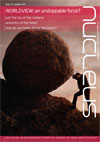People cannot make sense of anything without attaching it to a storyline. Our worldview, that metanarrative by which we make sense of the world, is not theoretical, but rather has a profound influence on how we live and work.
Timothy Keller writes, 'If you get the story of the world wrong — if, for example, you see life here as mainly about self-actualisation and self-fulfilment rather than the love of God — you will get your responses wrong, including the way you go about your work… At a day-to-day level, our worldview will shape our individual interactions and decisions'. (1)
How we think affects how we live, behave and work. However, if we want to impact our colleagues and patients and be faithful and fruitful in the longterm, we must keep close to Jesus, being filled with the Spirit as we give out. One doctor writes, 'Only if Jesus stays real to the heart can you be consistently joyful enough in him to avoid making medicine your whole self-worth, and then becoming hardened when you meet so much ingratitude'. (2)
As Christians then, let's look at some of the practical outworkings of our worldview and the opportunities we have as healthcare workers to respond and be distinctive in our work.
Compassion
Compassion is a direct outworking of God's character. regularly, when confronted with people in need, Jesus was moved to compassion and in each case, his compassion led to action that transformed the situation. at the cross, Jesus showed compassion in its most selfless sense by choosing to lay down his life for our salvation. this notion of self-sacrifice and compassion was at the heart of nursing and medical movements of the early church.
As we give out, let's bear in mind Hebrews 10:24. It really helps to meet with other christian medics and nurses where we can understand, pray for and encourage each other.
Being salt and light
How do we as Christians help to shape a better healthcare culture? Jesus was clear that as his disciples we are both salt and light. He doesn't tell us to be salt and light, but that we already are. The question is, are we salty enough, and are we putting our light where it can be seen?
Being salt is about stopping the rot and imparting flavour. Developing our Christian worldview by studying scripture and ethics, as well as keeping updated professionally, will help us be informed so we can challenge things that are wrong, keep what is good and encourage the best.
Light reveals reality and truth. At work it may mean speaking out hope among disillusioned colleagues, or working honestly and faithfully when others cut corners or show limited respect to colleagues and patients. It's a great opportunity to model collaborative multidisciplinary teamwork, to outwork our faith in practice by avoiding gossip and speaking well of each other.
One neonatal nurse has said, 'My work gives me a unique opportunity to love and serve others by coming alongside them when they need help and encouragement. Beyond providing medical care, loving and serving my patients often looks a lot like being a shoulder to cry on and an ear to listen. Being a nurse teaches me to be compassionate with my neighbour; it forces me to stand with them right in the midst of their pain and uncertainty and help them see light and hope'. (3)
Priority for the defenceless and poor
Jesus made it clear that to be his disciples, we are to be engaged with the pain and suffering of a fallen, sinful creation. In Matthew 25:31-46, Jesus commends or condemns on the basis of the care shown to the poor, the stranger, the sick and the imprisoned by those who claim his name.
If we understand that all of us are made in the image of god, then we are all worthy of the same respect and care, regardless of factors such as age, race, gender, sexuality or social class. We all have a God-given value and dignity, but we are also all sinners, in need of God's grace and forgiveness. none of us are ultimately any better or any worse than the other. In the first century this was revolutionary thinking, and led Christians to minister to large communities of the urban poor and sick whom respectable Romans and Greeks would seldom venture near. Indeed, the aims of the NHS to offer treatment irrelevant of how wealthy or 'deserving' a patient, were infused by this Judaeo-Christian worldview.
What about for us now? In your work this may mean remembering not to judge others. this might be tested on medical wards with repeated patient admissions for smoking or alcohol-related illnesses. ask the lord to help you care for all with respect and love.
Holistic care
I was recently reading about Dr Martin Lloyd Jones who, in 1927, argued (against the popular belief of the day) that patients' symptoms were often of a non-physical nature and so treatment should be given holistically. He saw that people have a spiritual nature, a moral nature, and a social nature, and if any of these are violated by unwise or wrong beliefs, behaviours, and choices, there can be interlocking physical and emotional breakdown. Although today there is more recognition of the multifaceted causes of illness, there is still great caution in encouraging health professionals to address spiritual issues. As christian medics and nurses, we believe god created and will resurrect our bodies — they are important! But God doesn't only care about bodies; he created and redeems our souls as well. So we need to bear the totality of the human person in mind. Recognise that behind physical symptoms there is often emotional and spiritual pain. Be alert for opportunities to address and talk with patients about spiritual issues, and to offer prayer if appropriate.
































